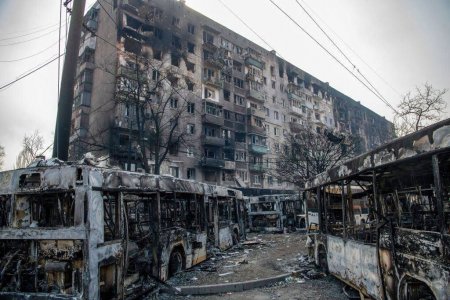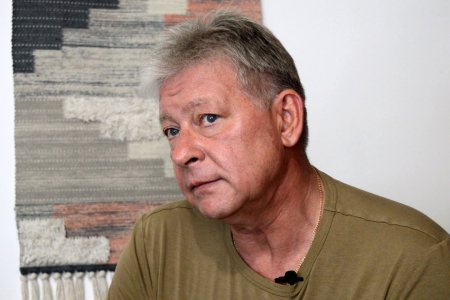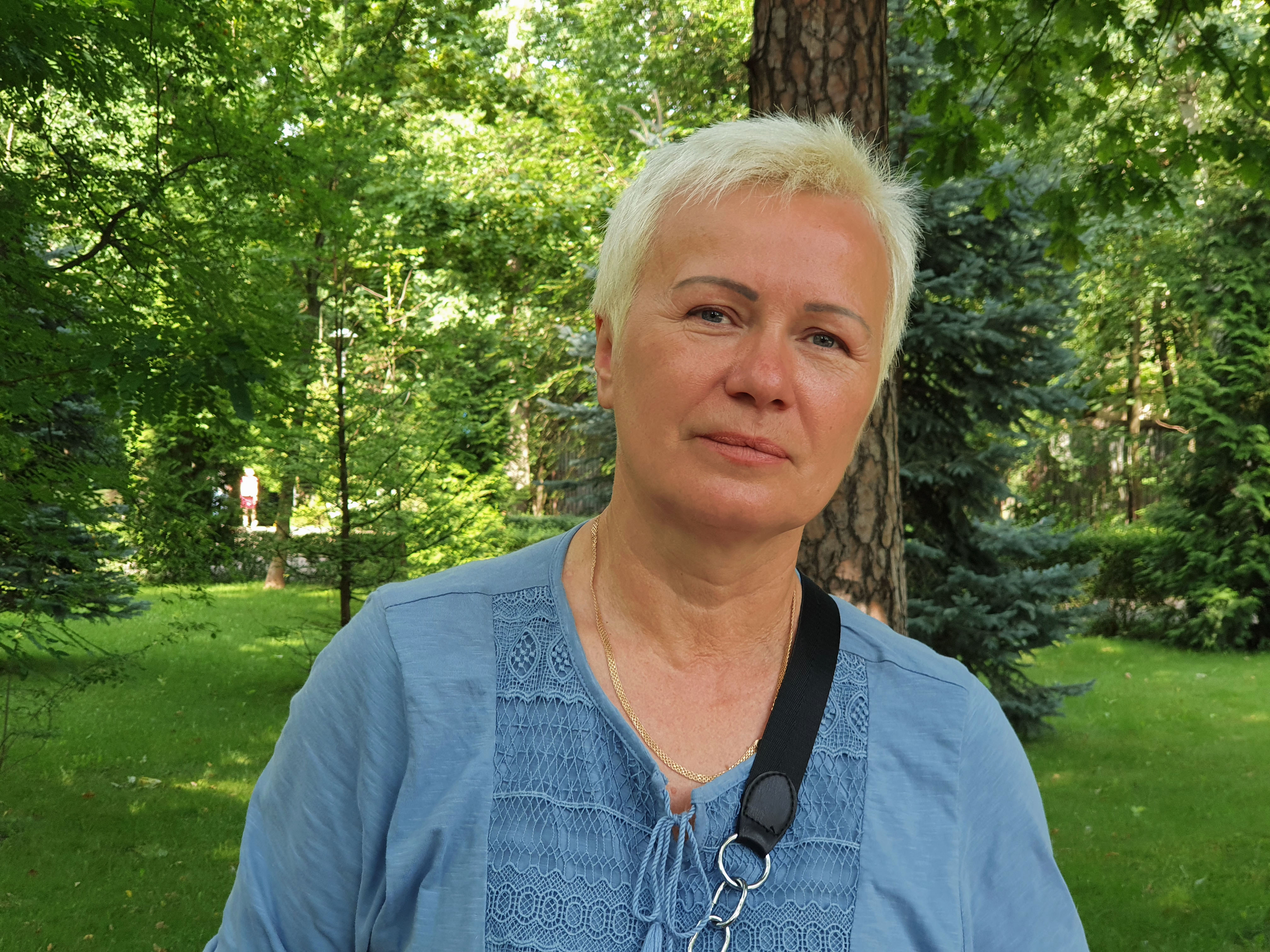
We met with Ludmila Sokolovska on August 14 in the city park in Bucha. Exactly 8 years ago, she and her Labrador named Best left Donetsk to finally settle in Mariupol..
After seeing with her own eyes the airstrike on the Drama Theater, the civil servant had to leave her home for the second time, trying on her way to rescue as many people as her car and the van could fit. The day after her departure, her house was hit, killing an elderly couple whom Liudmyla was taking care of.
This woman believes in the victory of Ukraine and even dreams of returning to her job in Donetsk, although she understands that she would have to live next to people who once sided with Russia.
Does the dog feel strongly all these changes that have taken place?
He was very worried when we started collecting things, he became very nervous. You should have seen how much he cared. He lived for 4 years in his apartment, on his balcony. He used to “watch TV” from the balcony: he sat and looked outside. But now there is no balcony, no house, no yard, and there is not even a city. This is because the city of Mariupol was destroyed, I believe, completely. And our district, where we have lived for the past 4.5 years, there is nothing alive there, there are only ruins.
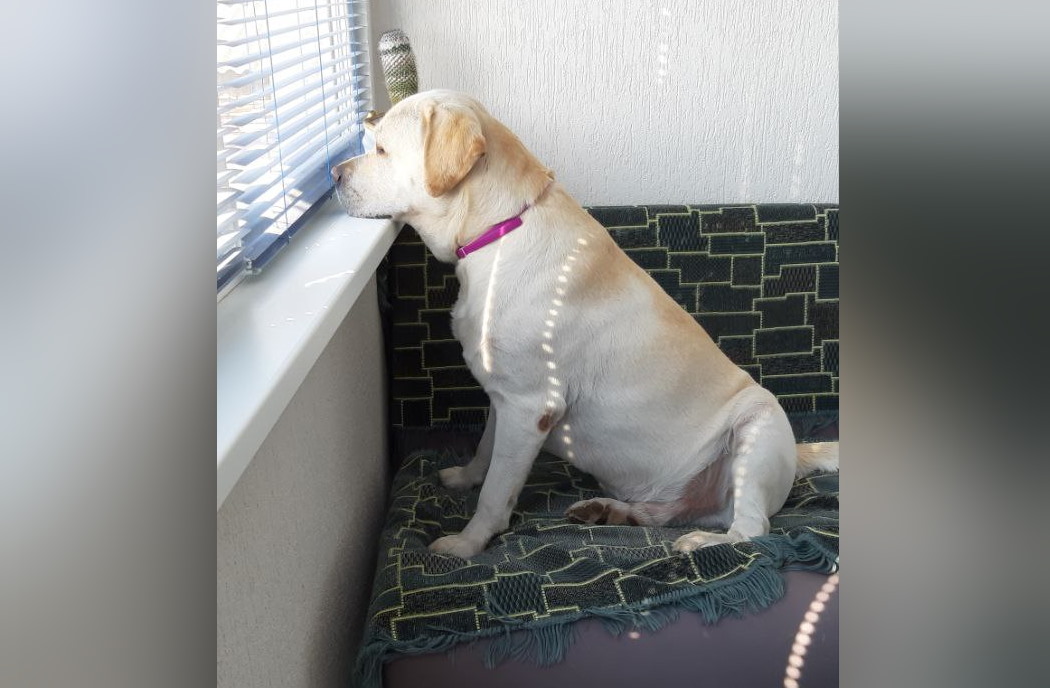
Did you live across the Mariupol theater?
Not exactly across, but about 200 meters away, the theater could be seen through the northern windows of our apartment. On February 22 or 23 I even tried to buy a ticket to a February 28 Monday performance.
Did they have a show on?
It was by Modern theater “Black Square” from Kyiv. It talks about life and life situations. Not classical, but modern theater. I don't know what stopped me [before buying a ticket]. All I had to do was to pay the money.
Is it true that the majority of Mariupol residents were pro-Ukrainian, patriots? Of course, it cannot be ruled out that there were people who were “waiting”...
At the beginning of 2015, yes, many were waiting for Russians. But later the mood began to change. Children began to study; people saw the difference between Donetsk and other territories that were under occupation — nothing was happening there. People who came on business told us what was going on. After 2015, there were many individuals who arrived from the occupied territories, and they already were more knowledgeable as they tried to stay, live and work there.
However, they realized that the prospects in their life were disappearing like a dream.

February 24. Cloudy and it is going to rain. I heard explosions somewhere to the east. There were several of them, it was very loud. It was scary, but I got ready and went to work.
So, you went to work on February 24? Did you still work in law enforcement?
I worked in the tax inspection. Workplace was 200 meters from home, so it was not far. In the previous week, the evacuation had already taken place, some documents were taken away, but some remained. The computers remained; it was necessary to at least preserve the office equipment. The Donetsk experience showed that it was essential to save everything that could be saved.
At that time, we lived with my husband in an apartment, and beginning Monday, February 21, he was sent to a new job and he was very happy. He passed an interview and started a new job on the construction of Metinvest Polytechnic. He managed to work there for 3 days only.
On the 24th, he went to work again where they began to resolve issues regarding conservation and preservation of property and various tools. And he probably went there on the 25th — it was still possible to move around the city, specifically in the district where we were. After 2-3 days, people from other districts began to appear in our neighborhood. They came from the eastern part of the city.
They started coming — looking for shelter?
They began to flee from their places of residence, because the offensive began from the east, and the Eastern neighborhood of Mariupol was already under fire from the 24th. Where we were, we could not hear what was happening in the East, and we did not know.
People began to appear, people with backpacks, with children, in cars. Many wore clothes not fit for travel as they were trying to leave as soon as they could. By March 15, when we made a list of those living in our community, we had 44 people. At the beginning of the war, only 20 people lived there.
“It became clear that there was nowhere to run.”
A respectable elderly couple, 90 and 92 years old, had an apartment on the same floor with us. Their son lived in the western part of the city, it was far away and he visited once a week delivering food and water. I had to help them with any other problems. We were looking for some bread for them, but she asked about her medicine. I explained that I can't help, because there was nothing available, but she did not understand, “How is it — there is nothing? And when will it be available?” I explained, “There is nothing because there is a war, and no one knows when it will become accessible.”
And so, every day it was getting worse and worse. I had an acquaintance in Primorsk, that is Zaporizhzhia region, beyond Berdiansk, 110 km from Mariupol. He called me and said that two columns, 200 units and 300 units, passed through them, and they did not enter either Primorsk or Berdiansk, but went in the direction of Mariupol. This was already the third day of the war. It became clear that there was nowhere to run.
On March 5, the Internet was still working, there was a mobile connection, and on March 5 we learned that there was a talk about the so-called green corridor which will allow us to leave the city. All those people who came to our neighborhood left their things, got into their cars and drove away. About 2-3 hours later, everyone who left our yard returned.
Were they turned back?
They returned home because they were not allowed to get out, no one was let out of the city. Everyone returned and carried their things back to the apartments.
Sometime on March 7, in the afternoon, my husband and I went out to walk through the areas where explosions were heard. We saw, about 300 meters from our house, the 4-story building which was missing two floors inside. There were 1st and 4th — hanging in the air, and the 2nd and 3rd were gone. And the residents sat in the yard and watched. Then in another yard we saw burned cars, something had hit there. It became very creepy, very scary, but still there was no exit from the city.
“We saw that the four-story building does not have two floors inside. There were a first and a fourth — hanging in the air. And the second and third were gone.”
On March 5, we still had phone service. During the night from the 5th to the 6th of March, the plane flew and through bombs and after that the communications finally disappeared, there was nothing.
Did they bomb the city center?
It was near us, but nothing was destroyed at that time, however, mobile connections disappeared for good and we no longer had any information.
‘No news’
What we have left was a neighbor's car in which he used to play “Radio Promin”. Nothing has changed in the life of this “Radio Promin”. If you are journalists, then I want to ask you to tell that “Radio Promin” or others who work on those frequencies, “When you broadcast a national marathon, you can interrupt it saying that at the zero minute we broadcast information for the occupied territories and inform, “Mariupol, wait for the green corridor”. And then, “Radio Promin welcomes you, today is March 15, and we want to tell you the poems of our Ukrainian poets.”
We had some gasoline in our car and also a battery, but it was outside in the cold, at night the temperature was up to -10 degrees in Celsius. When we started the car to get some information and the “Radio Promin” greeted us so gently, without hurrying, we felt sharply the difference between these two worlds and dimensions.
One day when the sky was clear and the weather was very fine, a drone flew over us. It flew several times and, in the evening, when we went down to the basement and the city was quiet, there was some kind of metallic sound, some kind of signal was allegedly sent off. That night, a plane flew in, it had already bombed peaceful houses along Italiyska Street and Semenyshyn Street. However, there were shots from that area during the day from some of our equipment, but they have already worked on the houses. Many houses were destroyed on Semenyshyn, they say. Houses were destroyed on Italiyskaya as well... It was scary.
There was a well nearby, but two mines flew into that well one morning, and people were wounded, there was blood. I saw people running, looking for a doctor. The water in the well was for technical use, but we boiled it because there was no choice.
Bestik [diminutive from Best] and I came by the theater often, almost every day. We came to the central entrance and asked what the news was, what was happening. Many people stood there, they talked, looked at each other, looked at the sky. When a plane flew by, they hid. Every day there was one answer, “There is no news.” “And how about the green corridor?” — “There is nothing.”
Sometime on the 15th, I went out and saw a car driving along our Italiyska Street, this street was part of the road from the Left Bank, from the Eastern micro-district. That car was probably from the Red Cross and it was followed by a bunch of cars — they were driving people who were civilians. And the cars were battered, without glass, people were sitting with stone faces, caring blankets, pillows and children, dogs were sticking out of the windows. The cars were filled densely with people and things. And so, during lunch, around 12 o'clock, such mass evacuation went on.
Those cars drove past our house. From the theater they went down to the sea and along the sea they left in the direction of Melekin crossing the port, everything was quiet. One of the neighbors said that the war was not felt in the port. When Bestik and I came by the theater in the evening on March 15, the cars that were parked around the theater disappeared and there were much fewer people. In the morning we heard that no one was allowed into the theater, because already more than 300 or 500 people were hiding there. And there was no space to let more people in, there were already too many people insight. They had to go to the toilet with their own bottle of water, because there was no water in the building, and everyone had to solve their sanitary needs on their own.
The attack on the Drama Theater: first there was a rocket, then a bomb
On the 16th, the sky was clear in the morning, the weather was calm, we came by the theater with my dog, it was somewhere around 8:20. At night, they destroyed the Central Universal Store. When we came by in the morning, “There was no news.” Somewhere closer to the church, people were trying to catch mobile phone connections, I tried to do the same and made a call. I did not succeed. We returned to the theater, there was a police car with white flags, more cars were gathering and I asked, “What's going on?” They said that around 9:10 a caravan of those who want to evacuate to Berdyansk is gathering. Policemen will be drivers.
As I was standing near the theater, I saw how this column had been assembled, the thought occurred to me that [this] was very dangerous. So many people, so many cars and the shopping mall have already been destroyed. I even remember the spot where I stood, watching. I took a photo from that spot.

All of those people in front of the theater, all of those cars, fear in everyone's eyes, and such a premonition of a terrible danger.
I returned home, had some breakfast, brought hot food to our neighbors. Although we had time to visit the hairdresser's a week before the war, my husband’s hair had grown a lot during this time. It was a clear sunny day, I offered to cut his hair. While I was trying to cut his hair, we rushed to the basement about five times. Why? Because planes were flying. They flew from the direction of the sea. I believe that those planes flew from Yeysk, because it is across the sea and is 20 km to Mariupol. They flew over us somewhere further — towards the Ilyich plant, they probably flew somewhere there.
But on the 4th or 5th approach of the planes, I think it was somewhere around 11:00, a plane flew in and fired a rocket right over us. He had already fired rockets the night before: 200 m from us, on Pushkin Street where two houses were completely destroyed. A pile of bricks and a large gap remained from one. From [my] entrance, I could see the roof of the theater and the service entrance. I ran to the second floor to look out of the window. My husband shouted, “Just don't go into the apartment!” I responded, “There is dust above the theater” — it was not smoke. That is, he shot the rocket at the roof of the theater in order to destroy the roof.
And then he shouted, “Quick, quick, quick, down, plane!” The plane again. That plane fired a rocket, entered the second circle, and then we heard a loud explosion. I think it was a bomb. There was a rocket, and then, on the second attempt, he went in and dropped a bomb on the theater. Later we went outside, moved towards theater and saw the fire. The theater was already burning at that time.
According to your observations and considering it was still morning, where there a lot of people in the building?
There were many people inside and more people were gathering. But I think there were even more people on the 15th. Some managed to leave, and on the 16th, there were only [those] who remained. They had no other place to go to.
When we left our yard, a woman was standing on Kuinji Street, she was standing with a large suitcase and two children. They looked like they were 3- and 6-year-old. Small children, they could not do anything by themselves, they could only carry a small backpack. The woman was standing with her suitcase and her children, and she was holding money in her hands. However, the cars were completely packed, they were already loaded. And the woman stood with those children and the suitcase and waved for someone to pick her up. Whether she was picked up or had to return to where she came from, I don't know. But this was the situation.
Those buses that tried to evacuate were shot and destroyed. And those attempts of organized evacuation, which were supposed to take place from the theater, never happened. This is because if we knew about evacuation, everyone else would know. And if everyone knew, the column could have been destroyed. Only those from Mariupol who had their own cars could leave.
Did you go outside after the explosion to take a look?
We didn't go out anymore. We couldn't. On that day, terrible things began to happen, we could no longer go out, because after the theater started to burn, the planes started flying over the city, directly over our district, and drop bombs. I don't know what kind of bombs they were. We were sitting in the basement at the corner of our house, and somewhere 10 meters from the corner there was a hit, right above us the plane released something. We heard a whistle, then a blow, but there was no explosion. I don't know what it was. Until the evening, the planes flew and dropped those things. I don't know whether they were blanks or unexploded bombs, not sure what it was.
There were no ambulances, their sirens disappeared sometime on the second or third day. In general, nothing was happening, the city was quiet, only the sounds of war could be heard.
How was the next night and what happened on the 17th?
In the evening of the 16th, a landmine landed on our neighbor's doorstep. This mine destroyed the door which was thrown into the street. It was on the first floor and the exit from the apartment lead to the street.
Did he die?
We were sitting in the basement and his family was in the bomb shelter at that time. A landmine hit, destroyed all the windows and threw the door out of the apartment.
The night from the 16th to the 17th of March was very quiet. There was no more artillery shots, nothing was happening. Only planes flew and dropped, dropped, dropped bombs. I already lost track of things, at first, I counted things that happened on 15, and 16. Lord, how long can this go on: there is nothing here, no one shoots back, but they kept flying and shelling. That was the night from March 16 to 17.
It started to get lighter outside, around 5 o'clock bombs, mines and the likes of them started flying in our direction. Their explosions were so loud that I asked my husband who just entered the basement, “Is that it? Is our yard gone?” He said, “We still have it, but it flew to the neighbor. It hit 50 cm from yesterday's strike. Everything was completely destroyed and everyone was going to run away, leave.” In our yard we still had two families with children, 8 and 5 or 6 years old. And those two families began to pack. And then my husband said, “Maybe we'll leave as well? Airplanes and shells, everything is already flying towards us.” The circle of people who stayed was shrinking. People were going to Azovstal, it was only several kilometers from us. We started to pack and there was panic.
Did you have a car?
We had three cars parked in our yard. One was mine, an electric car, and there were two vans. At first, I shouted to my husband, “Throw the tires into the van”, — on February 22nd we picked up six summer tires for the two vans. But then that woman who was standing with a suitcase and two children, she was in front of my eyes during the last two nights. “Why are we taking those wheels?”, I shouted, “We can put people in our van instead!” We still had three neighbors’ families left, but they refused [to go].
And what about that 90-year-old couple?
The couple stayed on the second floor, in the morning I brought them more porridge and warmed it up.
We left and drove along the sea, on our way we saw destroyed houses, gutted cafes and buildings that were on the beach. Everything was destroyed by mines in direct attacks.
When we reached the port area, we saw people walking. Some waved their hands for us to stop and take them into the car. I stopped to pick up two female students and they sat next to me. There was a young fellow with them and I shouted to him, “get into the van!”, the van was behind. He didn't understand at first, but quickly figured it out. Later while we were driving, I would open the window and say to the people on the road if you would like to come with us, get into the van behind. And so, we gathered about 20 people. Also, there were small backpacks, handbags, cats and dogs in the trailer.
Did you get to the point where was a filtration camp?
At that time there were no filtration points yet. When we got to Mangush, there already where many cars with Z and they drove like they were at home. When I saw all this, it made a very disgusting impression on me.
We encountered huge column of cars that tried to cross the checkpoint. The line was enormous, but there was no filtering. They checked passports, undressed men, looked for tattoos, and for traces of weapons. There were three of us females in the car, we showed our passports and that was it, but we waited a long time for our van while all the men jumped out of it, undressed and got checked.
This is how we left, we stayed alive and took a couple dozen more people with us.
Were you going to Kyiv right away?
No. Right after Mangush, at the checkpoint, my car refused to switch from electricity to gasoline. It stopped in the middle of the field. We tried to fix it, but nothing worked. There was a tow rope, and we drove on the tow rope. The rope kept breaking and we kept splicing it, it happened several times.
When we reached the nearest village, Demyanivka, my husband apologized to the people and said that we cannot take them to Berdyansk, because we have our own problems. We left the passenger car in the village in the yard of one of the residents, got into the van, and drove on. But near Berdyansk there was a long line at the check-point, so we went to Primorsk.
Primorsk is my father's birthplace. We stopped there and lived for more than a month. On April 27, on the third attempt, we managed to leave Primorsk.
At first, we couldn't go because in a week we were supposed to come back to Demyanivka to pick up my car. We have heard how ships shelled Mariupol that day. I have an acquaintance who left Mariupol on the first day, and his home and workplace were still intact, but then his house was shelled from ships. The house was destroyed.
Did you get out when it was still calm, or were there fights around?
The car broke down again, there was no fuel and there was no way to buy fuel. My uncle, with whom we left [it], pumped all gas from my car as he needed it: there was a sick child, and they had to go to a hospital in Nikolsk. The van couldn't go either, because there was not enough diesel for 200 km drive to Zaporizhzhia. And it was impossible to buy fuel, so we sat there in Primorsk. You could still buy some food there and pay with bank cards. We stayed until the fuel appeared, and the opportunity presented itself. Also, we were still waiting for green corridors, which did not exist. Every day I called the Hotline and the Hotline answered, “Unfortunately, we do not have any information for you, call tomorrow at 8:00”.
People gathered on their own, made chats. Those who were able to leave described the routes they followed, wrote what the obstacles were, what the problems were.
“If this is not the last war in this world, then in the future everyone on the level with Hitler and Napoleon will study this name.”
As a civil servant, did you have any questions during your last trip? Did they let you out normally?
No, thank God, they didn't have anything yet, no databases. Beсause if there was that filtering, I don't know if I would be among the living or not.
They were trying to kill me, but I wasn't killed. To be honest, I felt very sorry for those soldiers. They were very open with us, they said that they were from Dagestan, that there were 30 of them and out of 30 there were either 11 or 12 different nationalities. They spoke different languages and there were two languages that they didn't even understand. They told us that Dagestan is smaller than the Donetsk region. Also, they do not understand each other when they speak in their languages. And then they smiled and said, “Here we study Ukrainian.” To which I replied, “You would be better off studying your languages at home and you would all be in one piece and healthy.”
Do you have grudges?
For what? Against whom?
Against them.
They were very open with me. Caucasian peoples respect women very much, especially when the woman is older. They are brought up to be very respectful towards their elders.
I put this question to all of my interlocutors. If there is a tribunal, what questions would you like to ask Putin and the people who planned this crime?
What can I ask them?
Do you comprehend in general why they attacked, why did they do what they did, what is their ultimate goal, what is their understanding of all this?
If this is not the last war in this world, then in the future everyone on the level with Hitler and Napoleon will study this name. It goes without saying and it doesn't need to be asked. But what do my relatives think? They said, “Let them bomb you there.” It is clear that I have no relatives, because most of my parents' relatives live in Erefia. I don't even want to say “in the Russian Federation”. In Erefia.
Now you are without a house. Do you see the future?
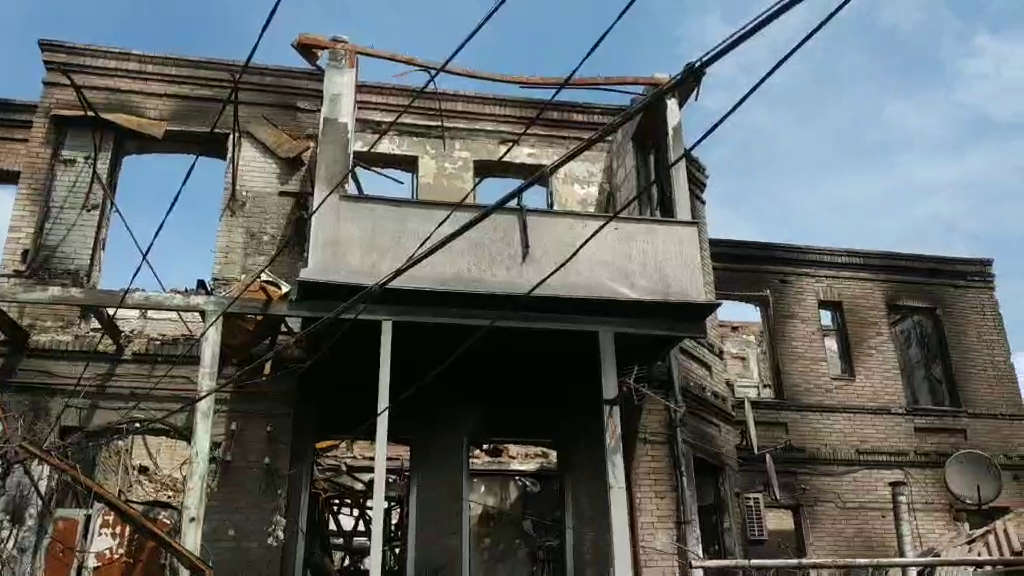
It is very difficult to answer this question. I still believe in our victory, we must win. I hope that Mariupol and Donetsk, and my place at the Donbas Arena, will be freed. That we will still see football at the Donbas Arena — I really hope for it.
